How Hard Is It To Learn Korean? Here's What You Need to Know
Learning Korean – Is It Really That Hard?
Learning a new language is always exciting, but mastering it could be difficult.
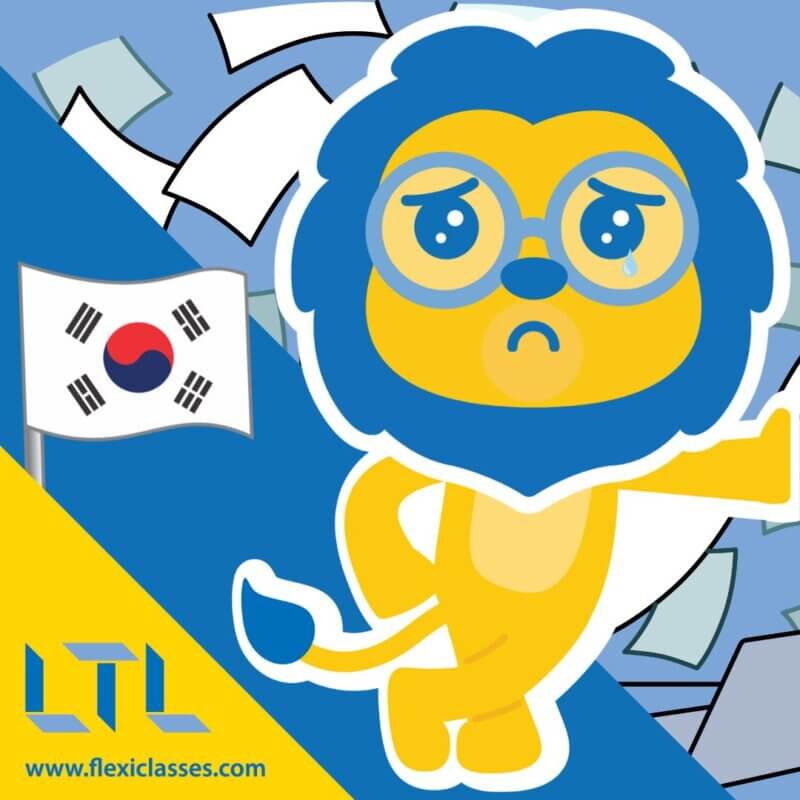
And there’s no denying that for English speakers, Korean is hard.
It has a different writing system (Hangul), a complex grammar system with honorifics, verb conjugations based on politeness levels, and a subject-object-verb (SOV) sentence structure, which is vastly different from English.
There are also many cultural differences and nuances you’ll have to grasp in order to fully understand the language.
But ultimately, the easiest language to learn for anyone is the language they’re most willing to spend time on.
Let’s take a closer look at some of the challenges Korean language learners face and how to overcome them.
How Hard Is It To Learn Korean | 발음 (bal-eum) Pronunciations
How Hard Is It To Learn Korean | 존댓말 (jon-det-mal) Honorific System
How Hard Is It To Learn Korean | 문법 (moon-bup) – Grammar
How Hard Is It To Learn Korean | Quiz
How Hard Is It To Learn Korean | FAQ
발음 (bal-eum) Pronunciations
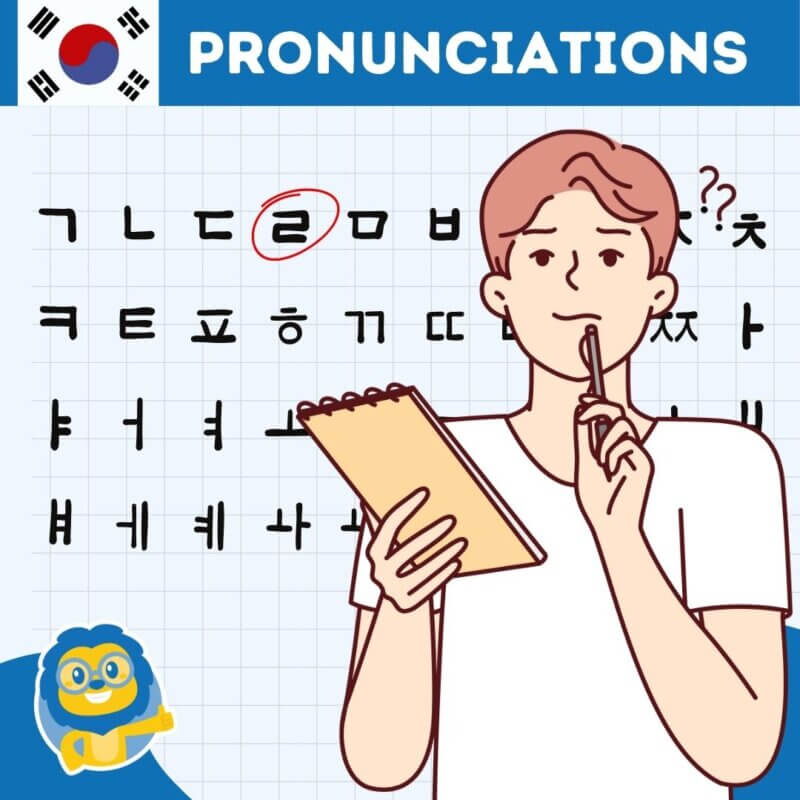
The Korean writing system 한글 (hangeul) could be easy to master at first, however learners face difficulties when trying to pronounce certain words.
When the vowels called 모음 (mo-eum) and consonants called 자음 (ja-eum) combine to form words, the pronunciation can get very tricky.
For example, the most difficult pronunciation foreigners face is when the letter ㄹ is included in a word.
Let’s take an example:
The word 일요일 (il-yo-il) means Sunday.
The actual pronunciation of the letter ㄹ is somewhere between an L and an R. It isn’t exactly an L nor an R. The best way to pronounce this would be 이료일 (ee-ryo-eel). This is how it sounds like when a Native speaks casually. The ㄹ is moved to the next word giving less stress to the pronunciation.
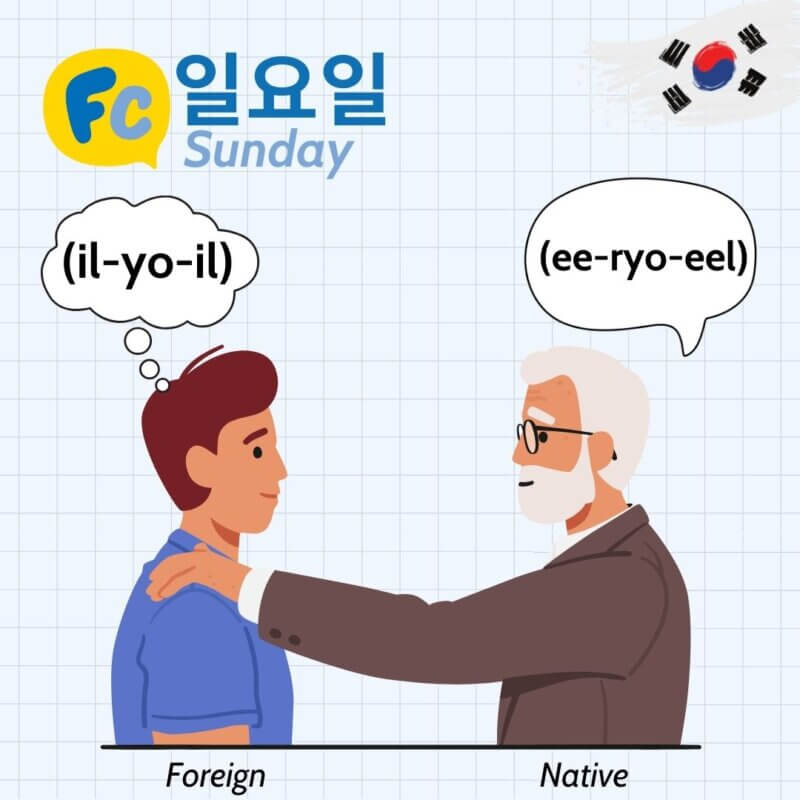
Let’s look at another example.
To a Native, 오 (oh) and 어 (uh) are some of the simplest pronunciations in the Korean Hangul. But surprisingly this is one of the most difficult pronunciations for most foreigners. To Koreans, the distinction between 오 (oh) and 어 (uh) is very clear.
But it’s difficult for Korean language learners to distinguish them, especially when spoken together. The best way to master these two pronunciations is to practice many words that include them. This way, you’ll know which sound it is as you already memorized the word!
Last but not least, any words that involve 의 (ui) are difficult to pronounce.
This isn’t just for foreigners but some Koreans also face the challenge!
For example, 의자 (ui-jia) – chair or 의지 (ui-ji) – rely on.
When pronouncing these words, try to pronounce them like 의 (ui) is two words: U and EE, and quickly pronounce the two. Remember that the U here is pronounced more like an eh and not how we usually pronounce U in English. Give some practice and it will help ease the difficulty.

10 Common Korean Curse Words 🤬 Speak Like a Native
There’s no better way to speak like a native to use a swear word or two. The Korean language is no exception, check out 10 Korean Curse Words to learn.
존댓말 (jon-det-mal) Honorific System
📚Mastering the Honorific System in Korean is another challenge for Korean language learners.
If you are a learner from a Western culture, this might be even more difficult. The Korean culture is deeply rooted in Confucian philosophy, where hierarchy plays a significant role. Honorific Systems, or 존댓말 (jon-det-mal) as many like to put it, let people respect hierarchy from the words they use. Although memorizing can get you by for some time, understanding the Honorific System is crucial to improving your Korean.
There are officially seven different speech levels.
Koreans only commonly use 3-4 of them.
Let’s briefly cover the levels to get a picture of when each level is used.
| Level | Korean Term | transliteration |
|---|---|---|
| 1 | 하소서체 | hasoseoche |
| 2 | 하십시오체 | hasipsioche |
| 3 | 하오체 | haoche |
| 4 | 하게체 | hageche |
| 5 | 해라체 | haerache |
| 6 | 해요체 | haeyoche |
| 7 | 해체 | haeche |
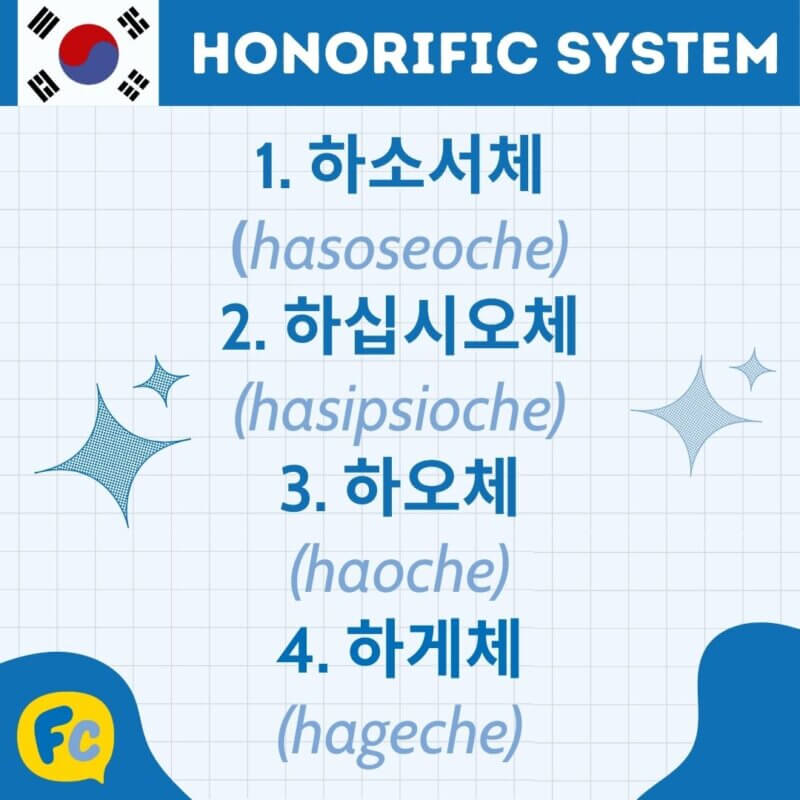
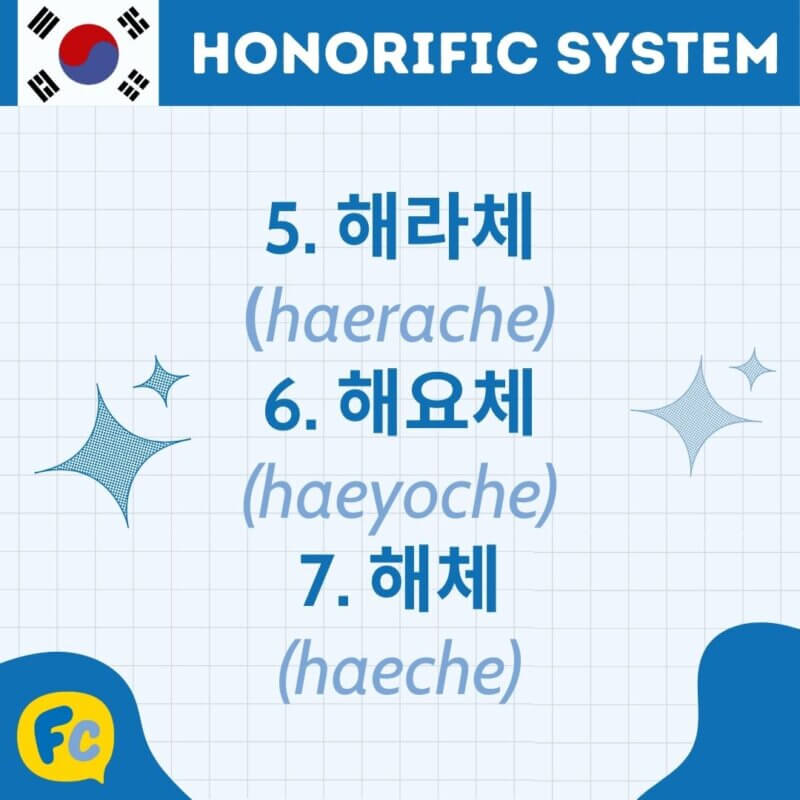
하소서체 (hasoseoche)
💭 This is the most formal speech level in the Korean language.
Although now it is rarely used, this was a speech level used in the past to royalties or high officials. Nowadays, you may only hear these speech level in historical Korean dramas and the Korean Bible.
천하, 자비를 배푸소서 (jeon-ha, ja-bi-reul bae-pu-so-seo)
English: Your Highness, please have mercy.
| Korean | transliteration | English |
|---|---|---|
| 전하 | jeon-ha | Your Highness |
| 자비 | ja-bi | mercy |
| 배푸소서 | bae-pu-so-seo | to have |
하십시오체 (hasipsioche)
This is an extremely polite form of speech usually used in public speeches or TV broadcasts. This form is also used for people with high seniority or rank. You will notice the words will usually end with –십니까 (sip-ni-kka) or –습니다 (seup-ni-da).
| Korean | transliteration | English |
|---|---|---|
| 안녕하십니까 | an-nyeong-ha-sip-ni-kka | Hello |
| 반갑습니다 | ban-gap-seup-ni-da | Nice to meet you |
하오체 (haoche)
This isn’t commonly used nowadays. This is a speech level you will speak to people in a lower social rank but still shows a level of politeness.
It usually ends with —소 (so) or —오 (oh).
하게체 (hageche)
This is a speech level also not commonly used these days. It’s a speech level you will use to lower social ranks more casually.
It usually ends with —는가 (neun-ga) or —네 (ne).
해라체 (haerache)
This is one of the most commonly used casual forms. This is usually the casual form for command words. For example, you would usually hear this form of speech when parents are talking to their kids.
The sentence will usually end with —해라 (hae-ra) or –라 (ra) or –는다 (neun-da).
밥 먹어라 (bab-meog-eo-ra)
English: Eat your food
This should only be used by your peers or to someone younger than you.
해요체 (haeyoche)
The 해요체 (haeyoche) is a form of speech you will often hear in daily conversation. It is considered less formal but still shows a level of respect.
The sentence will end with –요 (yo).
For example:
| Korean | transliteration | English |
|---|---|---|
| 안녕하세요 | an-nyeong-ha-seo-yo | Hello |
| 미안해요 | mi-an-he-yo | I’m sorry |
해체 (haeche)
This form of speech is what we usually refer to as 반말 (banmal) the most casual way to speak to someone. 해라체 (haerache) is also informal but usually used in imperative forms.
Some common endings for this form are –아 (ah), –어 (uh), or 지 (ji).
해체 (haeche) on the other hand is the daily conversations you have with close friends or family members.
나 지금 공부해 (na ji-geum gong-bu-hae)
English: I am studying now.
As textbooks are theories, practical learning is more important. Practice using it so you can get yourself familiar and eventually master it. Taking structured classes that teach you step-by-step the basics of honorific systems will help you absorb the basics.

Best Apps to Learn Korean // Our Tremendous 12 for 2025
There have never been so many language learning apps on the market that nowadays! We analysed the best apps to learn Korean in 2021, so you don’t have to.
문법 (moon-bup) – Grammar
📚 Although 존댓말 (jon-det-mal) Honorific System is part of Korean grammar, the grammar I refer to here is the overall structuring of a sentence. As this is the complete opposite of English, it could be a challenge for learners at first.
As we all tend to form a sentence in our mother language first and convert this to the second language, it involves a lot of practice to get the grammar right.
For instance, the basic Korean sentence structure follows the subject-object-verb form while English follows the subject-verb-object form.

저는 야채를 좋아해요 (jeo-neun ya-chae-reul jo-ah-he-yo)
English: I like vegetables.
| Korean | Romanization | English |
|---|---|---|
| 저는 | jeo-neun | I |
| 야채를 | ya-chae-reul | vegetables |
| 좋아해요 | jo-ah-he-yo | like |
✨ A GREAT TIP – for learning grammar is to know this structural difference by heart. For example, always remember that the verb comes last in sentence structuring.
Now that wasn’t so difficult was it?
Or maybe just a little bit! But remember that no language is simple enough for anyone to pick up right away. It always takes time to learn the basic structures and cultural context involved.
USEFUL VOCABULARY
👇 We should have you pretty well covered with the following vocabulary and phrases:
| Korean | Transliteration | English |
|---|---|---|
| 한글 | hangeul | Korean writing system |
| 발음 | bal-eum | Pronunciation |
| 모음 | mo-eum | Vowels |
| 자음 | ja-eum | Consonants |
| 일요일 | il-yo-il | Sunday |
| 의자 | ui-ja | Chair |
| 존댓말 | jon-det-mal | Honorific language |
| 하소서체 | hasoseoche | Highest formal speech level |
| 하십시오체 | hasipsioche | Extremely polite speech level |
| 반갑습니다 | ban-gap-seup-ni-da | Nice to meet you |
| 해요체 | haeyoche | Polite but casual speech level |
| 반말 | banmal | Informal speech |
| 문법 | moon-bup | Grammar |
| 공부하다 | gong-bu-ha-da | To study |
| 좋아해요 | jo-ah-he-yo | To like |
| 어렵다 | uh-ryup-da | Difficult |
| 쉽다 | ship-da | Easy |
| 문화 | moon-hwa | Culture |
| 야채 | ya-chae | Vegetables |
| 한국어 | han-guk-eo | Korean language |
Don’t forget to check out our Flexi Classes & our Korean Blog
👉 The Best Way to Learn Korean
👉 How to Say Yes in Korean: A Beginner’s Guide
👉 How long Does it take to Learn Korean?
How Hard Is It To Learn Korean | Quiz
Have you correctly learned the Korean vocabulary on this page?
Have a try right now and get immediate results:
How Hard Is It To Learn Korean | FAQ
Is Korean a Tonal Language?
No, Korean is not a tonal language like Mandarin or Vietnamese. Unlike languages where the pitch or tone of a word can change its meaning, Korean uses pitch and intonation more for emotional expression and emphasis rather than distinguishing between word meanings. This can actually make Korean easier for English speakers to learn compared to tonal languages, as you don’t need to master complex tonal variations to be understood.
How Long Does it Take to Learn Korean Fluently?
The Foreign Service Institute (FSI) classifies Korean as a Category V language, meaning it’s considered one of the most difficult languages for English speakers to learn. On average, it takes approximately 2,200 hours of dedicated study to reach professional working proficiency. This translates to about 4-7 years of consistent learning for most people. However, with intensive study and immersion, some learners can achieve conversational fluency in 1-2 years.
Is the Korean Alphabet (Hangul) Difficult to Learn?
Contrary to popular belief, the Korean alphabet (Hangul) is actually one of the most logical and straightforward writing systems in the world. Most learners can master the basic alphabet in just a few days to a week. The characters are designed to visually represent the shape of the mouth when pronouncing sounds, making it an incredibly intuitive system. Unlike Chinese or Japanese, you don’t need to memorize thousands of complex characters to read and write.
Do I Need to Learn Korean Honorifics?
Yes, understanding Korean honorifics is crucial for effective communication. The Korean language has a complex system of social hierarchy reflected in speech levels, which change based on the age, social status, and relationship between speakers. There are seven primary speech levels, though most learners focus on three to four main levels. While this might seem overwhelming, it’s an essential part of Korean communication that shows respect and understanding of social dynamics.
What’s the Hardest Part of Learning Korean?
Most learners find the sentence structure and grammar the most challenging aspect of Korean. Unlike English, Korean follows a Subject-Object-Verb (SOV) word order, which means sentences are constructed differently. Additionally, Korean uses a complex system of verb conjugations that change based on formality, tense, and the speaker’s intention. Verb endings can completely transform the meaning of a sentence, requiring learners to develop a nuanced understanding of context and communication style.
How do you say difficult in Korean?
어렵다 (uh-ryup-da) – difficult
Example:
한국어가 어려워요 (han-gu-ge-ga uh-ryeo-wo-yo)
Korean is difficult
How do you say easy in Korean?
쉽다 (ship-da)
Example:
한국어가 쉬워요 (han-gu-ge-ga shi-wo-yo)
Korean is easy
Want More From LTL?
FANCY LEARNING KOREAN? Check out our online Korean courses here.
We offer a 7-day free trial to all online students where you can study Korean 24/7.
Want to study Korean in Korea instead? Our Korean courses in Seoul can either be taken in small groups of no more than 5 students or individually for a more tailored experience.
We even offer incredible homestay experiences in Seoul too.
To top it all off, it certainly doesn’t end with Korean. Check out the other languages we teach 👇🏻










